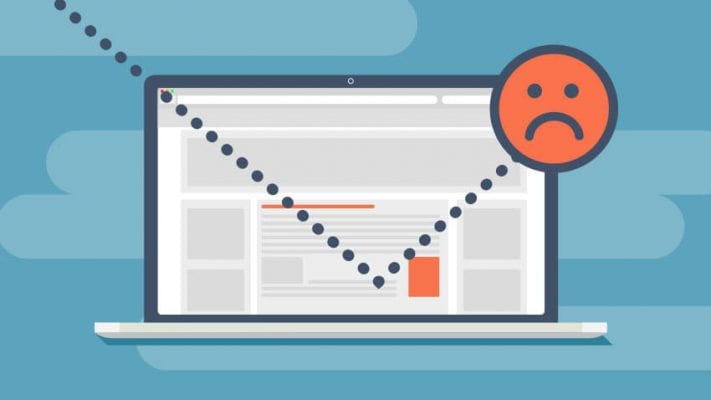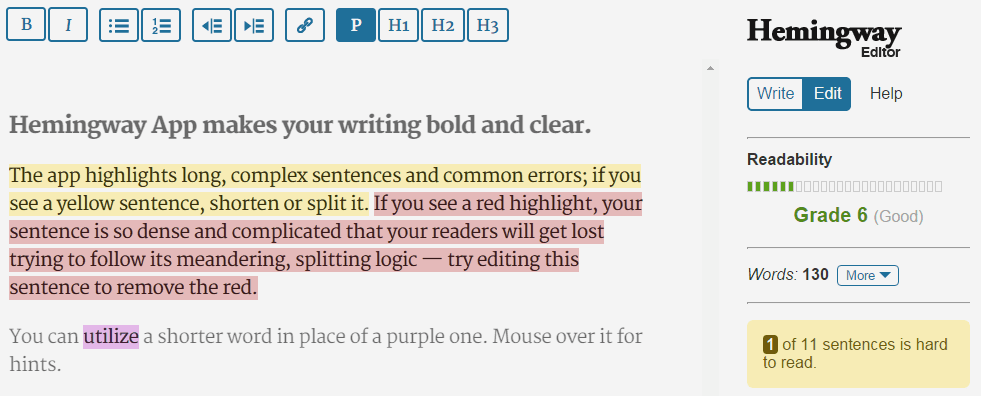Getting to the first spot on Google is great and all, but you won’t stay there long if you can’t put together a readable, enjoyable article. If your perfectly optimised blog post doesn’t read well, visitors aren’t going to stick around and flick through the rest of your site.
If your content is engaging, well-worded and grammatically spectacular however, your readers are going to trust what they read; they might comment, share, buy, or view further articles. On the other hand, an introductory paragraph riddled with misplaced apostrophes and sentences that meander away into the abyss is a sure-fire way to turn readers away in their droves.
What does this mean for your site’s SEO? Well, ‘time on page’ and ‘bounce rate’ are two key factors when Google is weighing up the worthiness of your site for the top spot in the SERPs. This means that terrifying all your readers away with illegible content means that your site’s rankings will begin to suffer – regardless of all those well-positioned keywords.

Aside from pleasing human eyes, you’re also writing for Google. While ‘readability’ isn’t specifically listed as one of the 200 ranking factors established by Google, various references to the quality of content mean that readability has naturally become a crucial factor in SEO. So, to rephrase our earlier question – while its clear that poor copy will drive away sentient eyeballs, how does readability affect SEO as far as Google is concerned? Google’s readability ranking factors include:
Content Length
It’s as simple as this: longer articles are more likely to answer the user’s question. A 100 word post isn’t going to contain the same amount of information as a 1000 word article. A recent rankings factor study found that the average top Google result contained around 1900 words.
TDF –IDF
Short for term frequency–inverse document frequency (don’t worry, you don’t need to remember that), this factor looks at how often certain terms are used in order to accurately determine the subject of a piece. Synonyms and relevant indsutry buzzwords are useful – if you mindlessly repeat your keyword in its exact form, the readability and quality of your piece will suffer.
Keyword Density
Yes, your keyword(s) must be sprinkled throughout the text, but many sites fall short here: shoehorning keywords into copy is a brilliant way to make yourself sound like a clunky robot randomly generating text. Instead, get creative, and find ways to integrate your keywords without ruining the flow and intelligence of the piece.

Page Covers Topic In-Depth
Now, this is a tricky one as Google haven’t been particularly forthcoming with details on how their algorithm judges whether a topic is comprehensive or not. However, it goes without saying that a high quality, readable article will get to the heart of the matter being discussed, and provide a satisfying amount of information.
Grammar and Spelling
Good old Matt Cutts over at Google has been coy about the exact importance of this, however it is certainly a factor in rankings and besides – well-written copy is a big trust indicator when a potential customer visits your site. You’d think twice before ordering the ‘plane cheeseberger’ from a restaurant’s menu.
Reading Level
Once upon a time, Google used to provide us data on the reading level of articles. That information has since been hidden from the eyes of prying SEOs, and there is some discussion as to how Google uses the data. Common assumption is that a low-to-moderate reading level has a wider appeal, and therefore can aid a piece’s SERPs ranking.
Useful Content
Many SEOs believe Google may view ‘quality’ and ‘useful’ content as two separate things. If, for example, you were looking for advice on treating a headache, you would not particularly want to peruse an in-depth research paper on the chemistry behind headaches. Though a page on this issue may well be of a high quality, its level of depth would prevent it being particularly useful. A basic page offering different remedies would rank higher in theory, because it simply answers the question the user is asking.
These are the foremost readability ranking factors. However, readability extends beyond your own site and is equally worth considering in your linkbuilding strategy.
Quality of writing
Unsurprisingly, Google gives higher importance to inbound links to your site that have come from well written, high-readability websites. Spammy, keyword-stuffed articles linking to your own site will carry far less weight, and less benefit.
Word count
It’s far better to have a 1200 word piece linking back to you than a one-paragraph post. Or a haiku.
DIY Readability
Alright, readability 101. Take a look at this text.
“When editing your copy it’s important to make note of lengthy, convoluted sentences and common errors in grammar and spelling; often it can be easy to create a huge, multi-part sentence, when the best thing to do would be to shorten or split it into several, smaller parts that function just as well on their own. On occasion you may find your sentences are so densely packed and unnecessarily complicated that your readers – who only wanted a simple answer to their query – will, through no fault of their own, get lost trying to follow the meandering, splitting logic of your copy.”
A bit horrible, isn’t it? Alright, now let’s pull it apart and stitch it back together.
“When editing, watch out for lengthy sentences and errors. On occasion, you may find your sentences are so complicated that your readers will get lost.”
There, see? Same message, uttered in 25 words instead of 118. Lovely.
Best free tools to boost your site’s readability
Below are four of the best options when looking to improve your copy. They are all free to use and easy to navigate – simply fire them up and add your text!
Grammarly
This one is dead simple – spelling, grammar, odd phrasing; wherever your literary woes lie, Grammarly can help fix them. Simply install the app on Chrome. Grammarly can pick up on a ton of errors that may go unnoticed on other platforms.
Hemingway Editor

My personal favourite, this tool is quick, easy, and kind on the eyes. Simply throw your masterfully crafted copy into the editor and marvel as the algorithm tells you everything you have just written is rubbish, and suggests multiple ways it can be improved. This isn’t a tool built specifically for SEO readability, but nevertheless it can be invaluable in reducing the reading age of your piece (Google recommends a 9th grade reading level) and helping you build a more powerful, immediate article.
Yoast Plugin for WordPress
The Yoast plugin for WordPress is a dream to work with, handily pointing out little ways to improve your article with a clear and easy to use system. As of 2016, Yoast features a readability tool which gently prods you to make changes to your text in order to tick all of the right boxes with Google’s algorithm. Learn more about using the Yoast plugin here.
Automatic Readability Checker
If you’d rather ditch the more modern methods of judging readability for SEO, this site will scan your text for free and score it based on seven classic readability tests. Not as pretty as the others, but a quick and easy tool to use.

